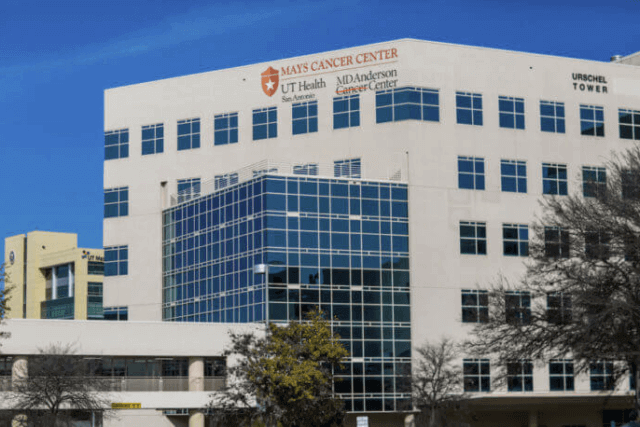Contact: Eileen Teves, 210-450-7239, tevese@uthscsa.edu
SAN ANTONIO, Oct. 16, 2023 – Mays Cancer Center at UT Health San Antonio will host the third annual San Antonio Liver Cancer Symposium on October 20 and 21 at the Hilton San Antonio Hill Country. The two-day event will bring together health care professionals from around the world to discuss new research and developments in treating liver cancer.
The goal of the symposium is for experts to cover the epidemiology of liver cancer, plus the pre-clinical, translational and clinical advances in treating this disease, including survivorship and liver tumors in pediatric patients.
Addressing the impact of liver cancer in minorities is significant in San Antonio. According to the US Department of Health and Human Services, chronic liver disease is a leading cause of death among the Hispanic and Latino population. Hispanic men and women are 1.6 and 1.7 times more likely to die respectively from liver compared to non-Hispanic whites.
“Liver cancer is a major health problem and the fourth leading cause of cancer-related deaths
globally,” said Francisco Cigarroa, MD, director of Malú and Carlos Alvarez Center for Transplantation, Hepatobiliary Surgery and Innovation at The University of Texas Health Science Center at San Antonio. “By 2025, the incidence of liver cancer is estimated to reach one million individuals. There have been major advances in understanding the process of how liver cancer develops and treating the two main types of the disease, but the outcomes are often less than optimal in at-risk populations. Our mission for this symposium is to identify practice gaps and to address them.”
Known as the heavy lifter, the liver is a major organ that is essential for digesting food and works as a natural detoxification system. It cleans toxins out of the blood and gets rid of old blood cells. When problems occur, liver disease may cause inflammation and mutations that lead to cancer. Building a community-based liver cancer program to improve early detection and diagnosis will be top of mind at the symposium.
The key to developing an effective program is collaboration among a team of dedicated researchers and clinicians in the detection, prevention and treatment of liver cancer,” said Sukeshi Patel Arora, MD, associate professor of medicine and leader of gastrointestinal malignancies program at Mays Cancer Center. “As an aging population grows, so will the need for care. This symposium gives us an opportunity to address improving access to care, including palliative care services, and providing support for patients and their families.”
According to the American Cancer Society, the most common form of liver cancer in adults is hepatocellular carcinoma (HCC), which can start as a single tumor that grows larger, or as many small cancer nodules throughout the liver.
Most people don’t exhibit signs and symptoms during the early stages of liver cancer. However, when they appear, the signs may include progressive weight loss, stomach pain, fatigue, weakness, enlarged liver, and yellow discoloration in the skin.
October is National Liver Cancer Awareness Month, a time to recognize and support people affected by liver cancer, and to remind the community about the risks, prevention, screening and treatment. The American Liver Foundation reports that 33,000 Americans die annually from liver cancer every year. Some of the risk factors include obesity, alcoholism, and poor lifestyle choices. Health care providers stress that early detection is key to increasing favorable outcomes.
Health care professionals, industry representatives, nurses, students and patient advocates are encouraged to attend the San Antonio Liver Cancer Symposium. Those interested may find the event helpful in improving their knowledge of the clinical treatment of liver cancer, plus receiving comprehensive updates on the most current advances in research and important information about the disease. Students and professionals who attend the symposium may receive credits for the following accreditations: Continuing Medical Education (CME), Maintenance of Certification (MOC) and Commission on Collegiate Nursing Education (CNE).
To register for the event and learn more about the San Antonio Liver Cancer Symposium, visit MaysCancerCenter.org/SALCS2023.
The Mays Cancer Center, home to UT Health San Antonio MD Anderson Cancer Center, is one of only four National Cancer Institute-designated Cancer Centers in Texas. The Mays Cancer Center provides leading-edge cancer care, propels innovative cancer research and educates the next generation of leaders to end cancer in South Texas. To learn more, visit www.UTHealthSAMDAnderson.org.
Stay connected with the Mays Cancer Center on Facebook, Twitter, LinkedIn, Instagram and YouTube.
The University of Texas Health Science Center at San Antonio (UT Health San Antonio) is one of the country’s leading health science universities and is designated as a Hispanic-Serving Institution by the U.S. Department of Education. With missions of teaching, research, patient care and community engagement, its schools of medicine, nursing, dentistry, health professions, graduate biomedical sciences and public health have graduated more than 42,200 alumni who are leading change, advancing their fields and renewing hope for patients and their families throughout South Texas and the world. To learn about the many ways “We make lives better®,” visit UTHealthSA.org.
Stay connected with The University of Texas Health Science Center at San Antonio on Facebook, Twitter, LinkedIn, Instagram and YouTube.


